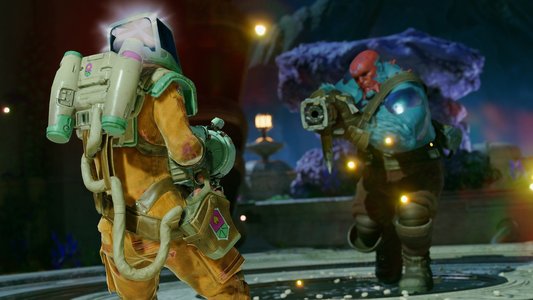[This week, our partnership with game criticism site Critical Distance brings us picks from Kris Ligman on topics including the closure of our sister site GameSetWatch, the obsolete ways games depict war, and more.] The internet… the final frontier. These are the roundups of This Week in Video Game Criticism. Its continuing mission: to explore strange new blogs; to seek out new writers and new forms of content. To boldly game where no one has gamed before! …Yeah, someone's on a "Next Generation" kick. Ignore me. We begin our retrospective tonight with a bit of somber news: the fantastic critical gaming blog GameSetWatch, pioneered by Simon Carless and platform to countless original essays and brilliant content, is closing its doors. But fret not. The boundaries of the ludodecahedron grow ever farther each day, and this past week has proven no exception with some exceptional samples of game-themed writing and discourse. We start with Robert Yang at The Radiator Blog, distilling the themes of a recent BLDGBLOG panel into an incisive commentary on the obsolete ways games depict war. You'll forgive me as I quote Yang at length:
"But the long con of these first person military manshooters is to tell you so many small unbelievable lies so you'll swallow the big ones: that it is possible to optimize a path to victory, that victory in war is even possible, that war involves soldiers and personal agency, and that war is fundamentally fair and just in the context of a balanced game system. (None of those things are true in Afghanistan.) By that measure, no AAA FPS currently depicts "modern warfare." The war they present, of roughly symmetrical forces meeting each other on battlefields in trenched combat, is an antique of World War II and the Korean War. The danger is not someone going out to shoot a school or impulsively join the army; the danger is that these games are affecting how we think of war in a decidedly misguided way, and that pattern of thought affects popular support of real-life wars that actually kill people."
(Emphasis from the original text.) Another compelling piece for this week is brought to you by Diana Poulsen at Kill Screen, describing ways in which games create ersatz memories:
"Videogames are distinct because they allow us to experience lives we'd never have a chance to live. We get to participate in the game, which strengthens our relationship to the experience. According to Landsberg, prosthetic memories try to create empathy rather than sympathy. [...] In empathy, you literally feel another person's plight."
Another article following in a similar vein of human perception comes to us via Gamasutra's Member blogs section, where Rob Lockhart writes about how media such as film and games take advantage of our limited "theory of mind," or the ability to perceive intentions or feelings in other beings–even game AI. Lieutenant, set the Holodeck to dragons. The ludodecahedron has been busy again writing about their favorite Elder Scrolls game du jour, covering subjects such as creating a system that trusts the player to find the story, the design underlying its morality spectrum, distorted senses of perspective, and aspects where Skyrim's worldbuilding does not quite ring authentic. But my favorite of the pack goes to Rowan Kaiser's piece for Gameranx on Skyrim's weather system. Weather, people! Over on Dinofarm Games, Keith Burgun gets his rant on over game-breaking power-ups and whether the onus is really on the player to re-balance an imbalanced game:
"if we're charging players with the responsibility of balancing our games, then why do we even bother trying to balance games at all? If anything's too powerful, we can simply trust that players will house-rule it out, right? [...] Designers need to take pride in your work and trust that you have the ability to create a ruleset that couldn't easily be improved by some random dude who happens to be paying for server fees."
Speaking of house rules turning into global rules, Machinima.com has been publishing an interesting four-part documentary on the history of the MMO. The first part can be streamed here, with links to the subsequent parts to the right of the video. And over on The Border House, Zaewen takes to task a series of graphics originating on Reddit, saying the way they model sexist versus nonsexist character design is too limited to be useful:
"[For] the last panel of this chart to be true and for it to have greater impact, we would need to see the real equivalent to the sexually objectified woman. We would need to see a man in heels and a skimpy, flimsy loin cloth that lifts and separates his balls, posed in an odd, unbalanced way that best shows off his impossibly tiny hips and waist and perfectly sculpted pecs while making a face better reserved for the bedroom than the battlefield. And ya know why we probably didn't get to see that in the last panel? Because it would look freaking ridiculous, just like the woman already does."
Mattie Brice entertains a similar notion in "On Men's Sexualization in Video Games", noting that many existing examples of sexualized men are intended as parodic, and that more needs to be done to correct the disparity. Brice also made a noteworthy appearance on Kotaku this week, taking to task not just that particular publication but an overwhelming culture of exclusion:
"I'm part of the gaming community, but Kotaku doesn't see me as a gamer. No, instead I'm a multi-racial transgender who-knows-sexual possibly-feminist woman gamer. A boogie monster. Someone who uses too many –isms and –ists in their daily tweets to actually enjoy anything. I don't think I've ever had anyone ask what it's like to be me in this pocket of society. You know that invisible ink in detective movies? If you could get an internet lighter, you'd find 'This site is for heterosexual white American men gamers.'"
No tags.








































